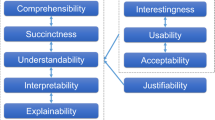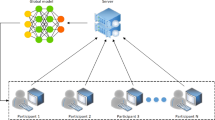Abstract
Federated learning (FL) provides a robust distributed framework for machine learning that solves privacy leakage concerns. In the some cases, it is hard to train the FL model with limited communication sources and low computational capabilities for the coordinator. Especially, designing an efficient framework for vertical federated learning (VFL) is a concern, as each party has unique data features. Hence, this paper proposes VFL-R, a novel VFL framework combined with a ring architecture for multi-party cooperative modeling. The VFL-R framework simplifies each party’s intricate communication architecture, defending against semi-honest attacks and reducing the coordinator’s influence in the modeling process. Several experiments challenge our framework’s communication performance against current VFL frameworks, highlighting that for similar test accuracy, VFL-R achieves O(K) number of communications in one communication round and an O(1) communication cost for the coordinator.





















Similar content being viewed by others
References
Hamon R, Junklewitz H, Sanchez G (2022) Bridging the gap between AI and explainability in the GDPR: towards trustworthiness-by-design in automated decision-making. IEEE Comput Intell Mag 17(1):72–85
McMahan B, Moore E, Ramage D (2017) Communication-efficient learning of deep networks from decentralized data. In: Proceedings of the 20th international conference on artificial intelligence and statistics, PMLR, vol 54. pp 1273–1282
Raza A, Tran KP, Koehl L, Li SJ (2022) Designing ECG monitoring healthcare system with federated transfer learning and explainable AI. Knowl-Based Syst 326:107763
Singh S, Rathore S, Alfarraj O, Tolba A (2022) A framework for privacy-preservation of IoT healthcare data using federated learning and blockchain technology. Future Gener Comput Syst 129:380–388
Wang YC, Tian YY, Yin XY, Hei XH (2020) A trusted recommendation scheme for privacy protection based on federated learning. CCF Trans Netw 3(3-4):218–228
Liu Y, Ben T, Vincent WZ, Chen K (2020) Federated recommendation systems. Federated Learn Priv Incent 12500:225–239
Jiang X, Zhou XB, Jens G (2022) Privacy preserving high-dimensional data collection with federated generative autoencoder. Trauma Surg Acute Ca 2022:481–500
Xin BZ, Yang W, Geng YY, Chen S (2020) Private fl-gan: Differential privacy synthetic data generation based on federated learning. In: 2020 IEEE international conference on acoustics, speech and signal processing, pp 2927–2931
Paragliola G, Coronato A (2022) Definition of a novel federated learning approach to reduce communication costs. Expert Syst Appl 189:116109
Abdellatif AA, Mhaisen N, Mohamed A (2022) Communication-efficient hierarchical federated learning for IoT heterogeneous systems with imbalanced data. Future Gen Comput Syst 128:406–419
Feng CS, Liu B, Yu KP, Goudos SK (2022) Blockchain-empowered decentralized horizontal federated learning for 5G-Enabled UAVs. IEEE Trans Ind Informs 18(5):3582–3592
Yang Q, Liu Y, Chen TJ, Tong YX (2019) Federated machine learning: concept and applications. ACM T Intel Syst Tec 10:1–19
Ou W, Zeng JH, ZJ G, Yan WQ (2020) A homomorphic-encryption-based vertical federated learning scheme for rick management. Comput Sci Inf Syst 17:819–834
Hou J, Su M, Fu A, Yu Y (2021) Verifiable privacy-preserving scheme based on vertical federated random forest. IEEE Internet Things 9461157:1–1
Li QB, Wen ZY, Wu ZM, Hu SX (2021) A survey on federated learning systems: vision, hype and reality for data privacy and protection. IEEE T Knowl Data En 9599369:1–1
Cheng KW, Fan T, Jin LY (2021) Secureboost: a lossless federated learning framework. IEEE Intell Syst 36(6):87–98
Zhu HY, Wang R, Jin YC, KT L (2021) PIVODL: Privacy-Preserving vertical federated learning over distributed labels. IEEE Tai 9664283:1–1
Zhang X, Ma Z, Wang A (2021) Lstfcfedlear: a LSTM-FC with vertical federated learning network for fault prediction. In: WCMC, p 2021
Chen XL, Zhou S, Guan B, Yang K (2021) Fed-EINI: an efficient and interpretable inference framework for decision tree ensembles in vertical federated learning. In: 2021 IEEE international conference on big data (big data), pp 1242–1248
Gu B, Xu A, Huo ZY, Deng C (2021) Privacy-preserving asynchronous vertical federated learning algorithms for multiparty collaborative learning. IEEE T Neur Netw Learn 9463409:1–13
Amanda CDR, Diego DFA (2021) Faster unbalanced private set intersection in the semi-honest setting. J Cryptogr Eng 11(1):21–38
Somchai P (2019) Database secure manipulation based on paillier’s homomorphic encryption (DSM-PHE). Int J Interact Mob Technol 13(12):136–151
Wang ZW, Zhang Y (2020) Malicious code detection for trusted execution environment based on paillier homomorphic encryption. IEICE Trans Commun 103(3):155–166
Yuan W, Hu F, Lu LF (2022) A new non-adaptive optimization method: stochastic gradient descent with momentum and difference. Appl Intell 52(4):3939–3953
Tang YJ, Vikram R, Zhang JS, Li N (2022) Communication-efficient distributed SGD with compressed sensing. IEEE Control Syst Lett 6:2054–2059
Ritesh N, Nihar BS, Ariel DP (2021) Loss functions, axioms, and peer review. Appl Intell 70:1481–1515
Wan L, Han SG (2007) Privacy-preservation for gradient descent methods. In: Proceedings of the 13th ACM SIGKDD international conference on knowledge discovery and data mining, pp 775–783
Vale T, Stacey T, Mehmet EG, Liu L (2020) Data poisoning attacks against federated learning systems. LNCS 12308:480–501
Jere M, Farnan T, Koushanfar F (2021) A taxonomy of attacks on federated learning. IEEE Secur Priv 19(2):20–28
Lu SW, Li RH, Chen X, Ma YN (2022) Defense against local model poisoning attacks to byzantine-robust federated learning. Front Comput Sci 16(6):166337
Malgorzata L, Jan M, Pawel T (2021) Estimating the class prior for positive and unlabelled data via logistic regression. Adv Data Anal Classif 15(4):1039–1068
Cheng SS, Liu JJ, Shi X, Wang K (2022) Rare variant association tests for ancestry-matched case-control data based on conditional logistic regression. Brief Bioinform 23(2):bbab572
Pietro M, Alessandro T (2017) Calibration of time-interleaved ADCs via hermitianity-preserving taylor approximations. IEEE Trans Circ Syst II Expr Briefs 64(4):357–361
Muhammad T, Chandan G, Ponnuthural NS (2019) Comprehensive evaluation of twin SVM based classifiers on UCI datasets. Appl Soft Comput 83:133–146
Jiang X, Zhou XB, Jens G (2022) Comprehensive analysis of privacy leakage in vertical federated learning during prediction. Proc Priv Enhancing Technol 2:263–281
Author information
Authors and Affiliations
Corresponding author
Additional information
Publisher’s note
Springer Nature remains neutral with regard to jurisdictional claims in published maps and institutional affiliations.
This work was supported by Fundamental Research Funds for the Central Universities (20CX05012A), the Major Scientific and Technological Projects of CNPC under Grant (ZD2019-183-008), and Shandong Provincial Natural Science Foundation of China (ZR2019MF070).
Rights and permissions
Springer Nature or its licensor holds exclusive rights to this article under a publishing agreement with the author(s) or other rightsholder(s); author self-archiving of the accepted manuscript version of this article is solely governed by the terms of such publishing agreement and applicable law.
About this article
Cite this article
Li, J., Yan, T. & Ren, P. VFL-R: a novel framework for multi-party in vertical federated learning. Appl Intell 53, 12399–12415 (2023). https://doi.org/10.1007/s10489-022-04111-0
Accepted:
Published:
Issue Date:
DOI: https://doi.org/10.1007/s10489-022-04111-0




